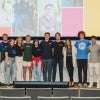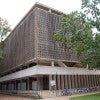
Dateline Rice for Sept. 20, 2024 Sep. 20, 2024
Dateline Rice for Sept. 20, 2024

Dateline Rice for Sept. 20, 2024 Sep. 20, 2024
Dateline Rice for Sept. 20, 2024

Xicana scholar Cherríe Moraga reflects on colonization, family and identity at Rice Sep. 20, 2024
Weaving together reflections on colonization and her family’s experiences in California, Cherríe Moraga recounted how over centuries the violence of colonization has shaped the state and its people in her new piece, “They Are Falling All Around Me — A Borderless América Reimagined.”

Mia X becomes first woman inducted into Rice’s Hip Hop Archival Collection Sep. 20, 2024
Mia X, known as the “Mother of Southern Hip-Hop,” made history once again by becoming the first woman inducted into Rice's Hip Hop Archival Collection Sept. 18.

Lilie showcases 8 student startups that are making a difference in their industries Sep. 20, 2024
Eight Rice student startups presented their ventures at the 2024 Summer Venture Studio Accelerator (SVS) Demo Day hosted by Rice’s Liu Idea Lab for Innovation and Entrepreneurship (Lilie) Sept. 17 in the Anderson Clarke Center. Lilie is the home for entrepreneurship education, exploration and acceleration for students, faculty and alumni from every discipline.

Staff Spotlight: Ted Walker Sep. 20, 2024
Staff Spotlight: Ted Walker

New Tent Series installations spark reflection on space, memory and social engagement Sep. 20, 2024
The installation of new temporary artwork in the Moody Center for the Arts’ Tent Series presents an intriguing dialogue between architecture, social engagement and narrative form.

Rice student team takes top prize in national competition with innovative medical device Sep. 20, 2024
A team of Rice engineering students was awarded the top prize in a prestigious national design competition for its innovative medical device for urological care.

Dateline Rice for Sept. 19, 2024 Sep. 19, 2024
Dateline Rice for Sept. 19, 2024

Lovett College to relocate, open on new site in fall 2026 Sep. 19, 2024
We are excited to announce significant news regarding our residential college system. Lovett College, one of our foundational colleges named after the university’s first president, Edgar Odell Lovett, is set to undergo a transformative change. This decision comes after a thoughtful and deliberate process by university leadership, including the board of trustees, and years of student leader advocacy and reflection on our commitment to maintaining our goals and priorities related to undergraduate housing.

NIH awards $2.8M to Rice, Baylor College of Medicine for research on acute respiratory distress syndrome Sep. 19, 2024
Rice and Baylor College of Medicine have received $2.8 million from the NIH for research on reducing inflammation and lung damage in acute respiratory distress syndrome patients.

Houston Methodist and Rice team up to track gut-brain connection Sep. 18, 2024
For the next two years, 120 Division I Rice athletes will be part of a concussion study with Houston Methodist researchers to identify reliable and novel concussion biomarkers in their gut microbiomes in ways that standard brain imaging cannot.

‘A natural fit’: Rice philosophy professor explains relationship between philosophy, technology Sep. 18, 2024
When Robert Howell contemplates the future of artificial intelligence, he foresees a world where an app might guide your moral decisions just as Google Maps helps you navigate a road trip.

‘Well within reason’: Fed makes first interest rate cut since 2020 Sep. 18, 2024
Rice experts John Diamond and Zach Bethune are available to comment on the Fed's decision to cut interest rates by a half percentage point.

Rice kicks off Latine Heritage Month with festivities, food Sep. 18, 2024
Rice’s Grand Hall was boisterously filled with students, music and festivities as the university began its many celebrations as part of Hispanic Heritage Month. Themed “Latine Heritage Month,” the festivities include programming across campus through Oct. 17 that spotlight the pride, passion and progress of Latine communities while also acknowledging the ongoing work toward greater recognition, representation and empowerment.

Dateline Rice for Sept. 18, 2024 Sep. 18, 2024
Dateline Rice for Sept. 18, 2024